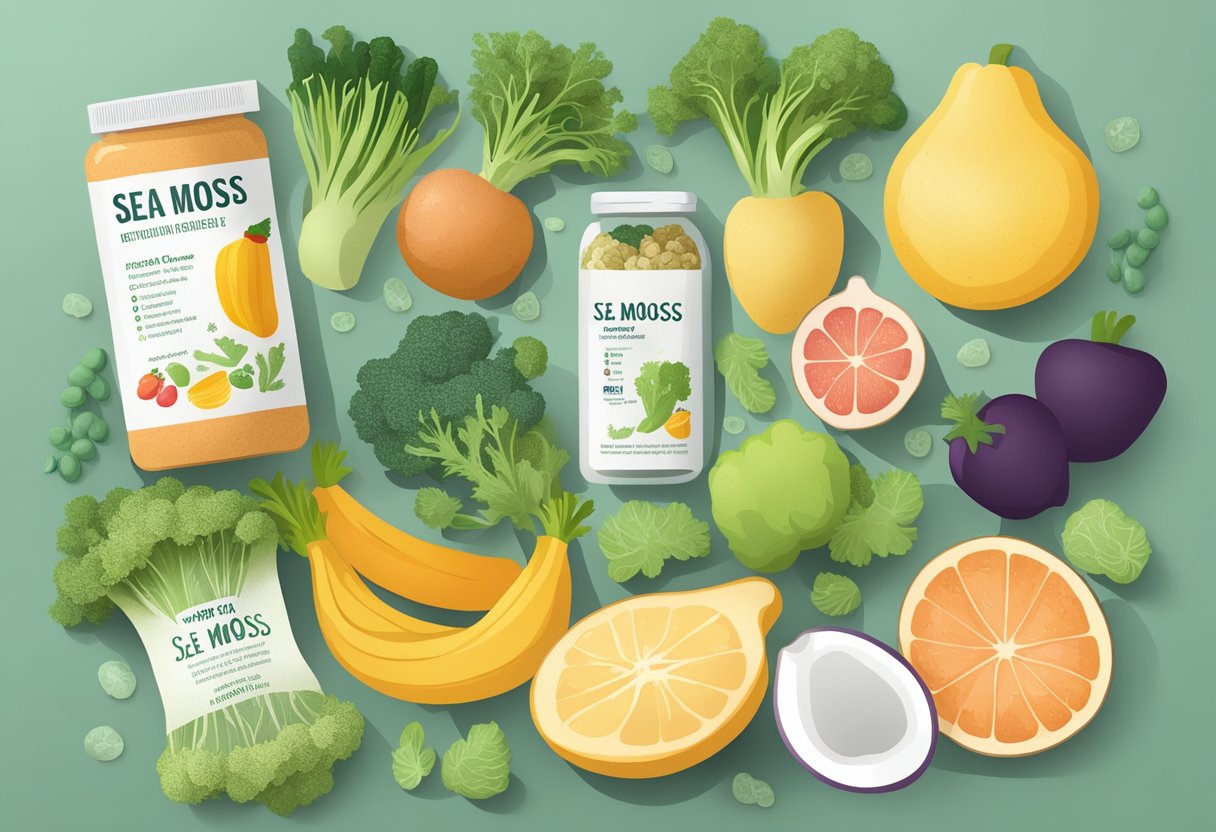Often found on the rocky parts of the Atlantic coastlines of Europe and North America, this seaweed is also known as Irish moss. Due to its high content of vitamins and minerals, sea moss is considered a superfood by many health enthusiasts. It is particularly noted for its fiber, iodine, potassium, and vitamin C content, all of which play vital roles in maintaining a healthy body.
Interest in sea moss has surged as research into its effects on the digestive system expands. The unique blend of bioactive compounds and prebiotic fibers in sea moss may help to promote the growth of healthy gut bacteria, which is crucial for digestion, immune function, and overall well-being. Incorporating sea moss into one's diet could potentially ease digestive issues, reduce inflammation, and support nutrient absorption. This has led to a variety of dietary supplements and products that include sea moss as an ingredient.
Key Takeaways
- Sea moss is rich in essential nutrients beneficial for gut health.
- It may improve digestion and promote the growth of beneficial gut bacteria.
- Incorporating sea moss into diets can be done through supplements and diverse food products.
Nutritional Composition of Sea Moss

Sea moss is a type of red algae that has been recognized for its remarkable nutritional profile, which may contribute to its potential benefits for gut health. It contains a wide array of vitamins, minerals, and fibers that are essential for maintaining a healthy digestive system.
Vitamins and Minerals in Sea Moss
Sea moss is known for its high mineral content, specifically:
- Calcium: Important for bone health and a contributor to the proper function of the digestive enzymes.
- Iodine: Essential for thyroid function, which regulates metabolism.
- Magnesium: Involved in many processes in the body, including regulation of muscle and nerve function, and blood sugar levels.
In addition to these minerals, sea moss is rich in several vitamins:
- Vitamin C: An antioxidant that supports the immune system.
- Vitamin B2 (Riboflavin) and B9 (Folate): Vital for energy production and contributing to the reduction of tiredness and fatigue.
These nutrients help support overall health, which is integral to maintaining a healthy gut.
Prebiotic Effects of Sea Moss
The indigestible fiber in sea moss may act as a prebiotic:
- Polysaccharides: Long-chain sugars found in sea moss may help nourish the beneficial bacteria in the gut.
This prebiotic effect can lead to an improved gut flora balance, which supports the intestinal barrier and contributes to better digestion and nutrient absorption. A healthy gut environment is crucial for overall health, and sea moss's nutrient-rich profile supports this.
Sea Moss and Gut Health

Exploring the benefits of natural remedies, many are asking, 'Is sea moss good for gut health?' This question leads us into a deeper understanding of how sea moss, a nutrient-dense red algae, may positively impact our digestive system.
Improving Digestion with Sea Moss
Sea moss is rich in fiber, which is essential for healthy digestion. The soluble fiber in sea moss can help increase the presence of short-chain fatty acids in the gut, which are vital for digestive health. This form of fiber can also aid in preventing constipation and promoting regularity.
The Role of Sea Moss in Gut Microbiome
Sea moss's role in the gut microbiome hinges on its prebiotic capabilities. Prebiotics are non-digestible food components that promote the growth of beneficial microbes in the intestines. The prebiotic content in sea moss helps nourish these beneficial bacteria, which in turn can enhance gut health and the immune system.
Sea Moss for Treating Digestive Disorders
For those experiencing digestive disorders, sea moss may offer a soothing effect due to its mucilaginous consistency. Sea moss can form a protective layer on the mucous membranes of the gut, which may help to heal irritated tissues and provide relief from disorders such as gastritis or ulcers. However, it is important for individuals to consult with a healthcare provider before using sea moss to treat any health condition.
Best Ways of Incorporating Sea Moss into Your Diet to Assist Gut Health

Adding sea moss to your diet can be beneficial for gut health due to its nutrient-rich profile and potential digestive benefits.
Recipes and Preparation
Sea moss can be prepared in multiple ways to aid gut health. Smoothies and soups are popular options, as they allow for the easy incorporation of sea moss gel. A typical recipe involves blending soaked or pre-made sea moss gel into your smoothie. Additionally, sea moss can be mixed into soups as a thickening agent without altering the flavor, thus delivering its gut health benefits in a warm, comforting dish.
Iced teas and juices present another avenue for including sea moss into one's daily routine. Infusing homemade sea moss gel into these beverages gives a nutritious boost. For a simple tea, dissolve sea moss gel in hot water, let it cool, and add lemon and honey for flavor.
Recommended Dosage and Usage
When adding sea moss to one's diet, it's important to follow recommended dosages to support gut health effectively. A common dosage is one to two tablespoons of sea moss gel per day. This could be one tablespoon in a morning smoothie and another in an evening tea. Regular consumption, following this guideline, provides a consistent nutrient supply to support the digestive system.
Frequency of consumption should be consistent, and making sea moss a part of one's daily diet can lead to gradual improvements in gut health. Before starting any new supplement, individuals should consult healthcare professionals, especially in contexts of specific dietary or health concerns.
Potential Side Effects and Considerations
While sea moss is generally considered safe for most people, there are possible side effects such as feeling nauseous or developing skin rashes in rare cases. Consuming sea moss within the suggested amounts minimizes the risk of adverse reactions. If any negative symptoms occur, such as gastrointestinal upset or allergic reactions, consumption should be halted, and professional advice should be sought.
It's crucial to source high-quality sea moss, as seaweed can absorb toxins from its environment. Certified organic products or sea moss sourced from clean waters are best to minimize potential contaminants. If there is uncertainty about whether sea moss can make you sick due to its origin or quality, additional research on the exact type of sea moss being consumed is advised.
Individuals with preexisting thyroid conditions should exercise caution with sea moss, since it is high in iodine, which can affect thyroid function. As with any dietary change, listening to one's body and consulting with a healthcare provider is always a good practice.





